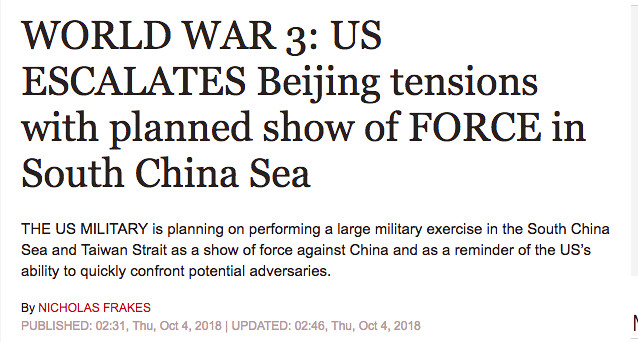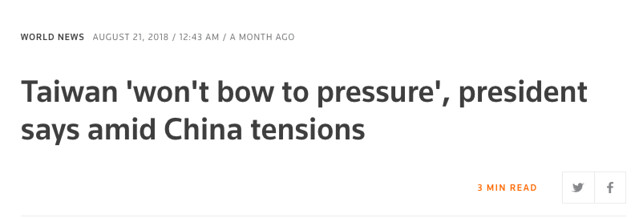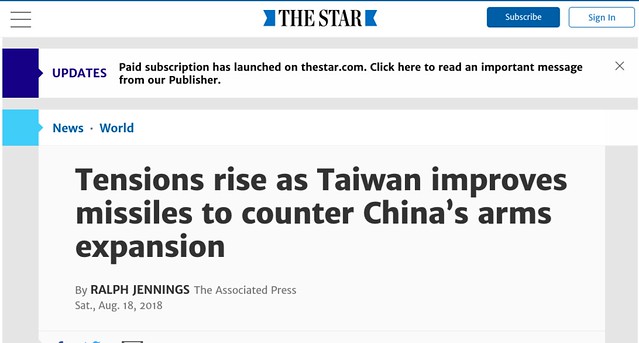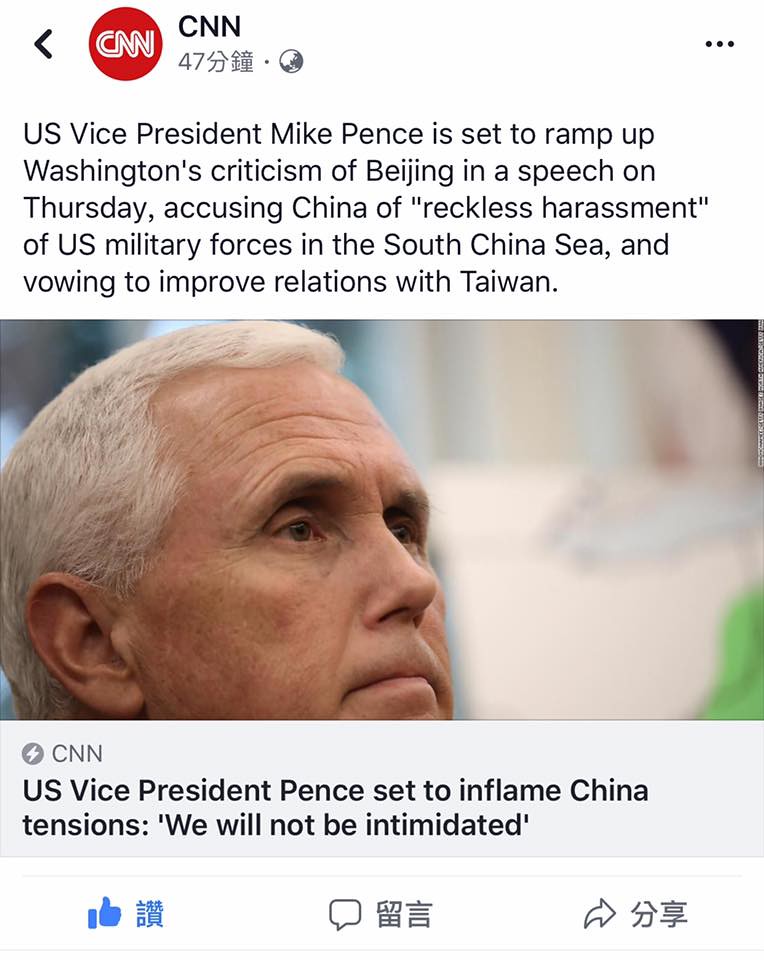Over the past few months, I've been keeping quiet track of something that's been a problem for awhile, because it's important to always keep a fire burning under the bum of anyone who reports on Taiwan.
Perhaps, with Michael Turton no longer blogging, someone's gotta do it. Perhaps I'm just fed up. I don't know. But in any case, it's once again time to look at the English-language media on Taiwan and their completely mangled ways of referencing "tensions" (OMG!) in the Taiwan Strait.
Let's get one thing out of the way - the tensions, such as they are, are always there. China wants you to think they're going up and down, but in fact when looking at it from Taiwan, nothing has really changed. My life is the same as it was on Election Day 2016. China attempts to chip away at Taiwan in little ways, but the "tensions" don't really change much beyond that.
But if you keep writing that they are "on the rise" or that "relations" keep hitting new "lows", people will think there's a real change. There isn't.
Notice the above - China is the one being aggressively expansionist in the South China Sea. China is the one that regularly threatens Taiwan with eventual annexation, actively tries to interfere in Taiwanese affairs, and attempts to diminish Taiwan's exposure and standing on the international stage.
Yet who is "inflaming" tensions? Not China - the US! For standing up to them! China can bully its neighbors in the region all it wants - if you dare stand up to that bully, you are the one "inflaming".
 I mean, this is in Express so don't take it too seriously, but not only does the US "inflame" tensions, it "escalates" them. At least it's not Taiwan creating "tensions" anymore, it's the US. Is that an improvement? I don't think so: it plays right into a lot of anti-West liberals' beliefs that everything Western is evil and everything Asian is great, and that evil empires can only come from the West. Therefore, if the power is non-Western, it must be better or more moral.
I mean, this is in Express so don't take it too seriously, but not only does the US "inflame" tensions, it "escalates" them. At least it's not Taiwan creating "tensions" anymore, it's the US. Is that an improvement? I don't think so: it plays right into a lot of anti-West liberals' beliefs that everything Western is evil and everything Asian is great, and that evil empires can only come from the West. Therefore, if the power is non-Western, it must be better or more moral.
This is absolute bollocks of course, but a lot of people believe it, and headlines like this don't help.
ALSO DON'T FORGET THE COMPLETELY GRATUITOUS AND UNPROFESSIONAL CAPITALIZATION.
 I call this the "Classic" - in this construction, tensions just appear. Nobody causes them. Nobody is the aggressor (or at least, the aggressor is definitely not China). It's left unclear, because to clarify it would be to say, clearly and accurately, that China is the one purposely causing "tensions", and encouraging those tensions to be reported in the press as either an issue that just is - and therefore could not possibly be solved by the CCP being slightly less churlish because these tensions sort of exist ambiently - or is somehow Taiwan's or someone else's fault. They do this in order to make Taiwan's every move difficult.
I call this the "Classic" - in this construction, tensions just appear. Nobody causes them. Nobody is the aggressor (or at least, the aggressor is definitely not China). It's left unclear, because to clarify it would be to say, clearly and accurately, that China is the one purposely causing "tensions", and encouraging those tensions to be reported in the press as either an issue that just is - and therefore could not possibly be solved by the CCP being slightly less churlish because these tensions sort of exist ambiently - or is somehow Taiwan's or someone else's fault. They do this in order to make Taiwan's every move difficult.
That's an accurate reading of China's strategy of "tensions", yet nobody seems to report it that way. Nobody assigns the proper agent.
Here are some more ambient "tensions" for you:

Oh great, Taiwan's biggest human boondoggle in journalism writing about tensions as though they rise independently, rather than someone (China) making them rise, and implying that the reason is Taiwan's actions of mere self-defense, rather than China's aggression (which necessitates that self-defense).
Tensions are like self-rising flour I guess. They just...rise.
If you think I'm being to harsh, read an excerpt below:
 I'm not sure how to read that last sentence, but it sure comes across to me as an implication that Taiwan maintaining its ability to defend itself from a Chinese attack - because remember, Taiwan has no intention of attacking Taiwan, but China absolutely talks of its intent to attack Taiwan - is what is "raising the chances of an armed conflict".
I'm not sure how to read that last sentence, but it sure comes across to me as an implication that Taiwan maintaining its ability to defend itself from a Chinese attack - because remember, Taiwan has no intention of attacking Taiwan, but China absolutely talks of its intent to attack Taiwan - is what is "raising the chances of an armed conflict".
Not, oh, say, the country that actually talks about how it plans to precipitate an armed conflict.
China can talk openly about its intent to start a war to annex Taiwan by force, and nobody will say it is "raising tensions", but when Taiwan tries to improve its ability to defend itself from that openly-admitted-to attack, it is "raising the chances of an armed conflict".
And finally, there's the one that makes me sad:
 I'd really hoped for better from The Guardian. I've written about this before, so won't belabor the point, but it's worth briefly repeating that this toes a line that, on either side, is not fair. Either it can be read as "relations reaching a low" with no agent pushing them to that low (although there is an agent: China), or it can be read as Tsai and her party (which "advocates for independence") being the ones who are causing the relation to "reach a low".
I'd really hoped for better from The Guardian. I've written about this before, so won't belabor the point, but it's worth briefly repeating that this toes a line that, on either side, is not fair. Either it can be read as "relations reaching a low" with no agent pushing them to that low (although there is an agent: China), or it can be read as Tsai and her party (which "advocates for independence") being the ones who are causing the relation to "reach a low".
The opposite is true: Tsai has done her best to be even-tempered and toe a peaceful line while not giving in to China's bullying (a wise policy maneuver that is often mischaracterized as her refusing to "make concessions" to China - as though the problem were her stance, not China's, and she should be the one to concede). Yet you won't reach that conclusion by reading this.
The headline of this one was a problem too, making it sound as though Taiwan's isolation had no agent causing it, when the truth is that China is the one working to isolate Taiwan.
That is the accurate way to report the situation - China as the principal agent, the bully, the tension-causer, the isolator - so how come nobody says so?
Anyway, let's end on a happier note:

This is from the Washington Post - good work. Finally, someone gets it right. Someone assigns the proper agent to the "feud", the "relations hitting a low", the "tensions" - someone finally points the finger right where it belongs: China.
It's a message that the West desperately needs to hear. Why couldn't CNN, The Star and The Guardian write like this? (Express gonna Express, whatever.)
The Washington Post getting it right notwithstanding, this feels like another season, another batch of "tensions" that nobody will admit China is causing.
I'll check back in around the New Year to see who is writing about these sentient, self-raising "tensions" that are always on the rise despite, in reality, their always being about the same.
I know, I was going to continue my previous post, but this came along, and I can't resist.
I generally avoid commenting on which checkbook ally has cut ties with Taiwan on any given day, because it's always the same story, and never a very interesting one. These allies not helpful in any way that matters to Taiwan - are they going to stand with us if China invades? (No.) Are these countries our biggest trading partners? (No.) Does Taiwan stop being a de facto independent state if it has no diplomatic allies? (No.)
But even more problematically, they recognize Taiwan in a sort of "what is the real China" decades-out-of-date death dance in which they're only recognizing Taiwan as the legitimate sole government of China. Which it isn't.
So, generally speaking - whatever.
But El Salvador is an interesting case. Why?
El Salvador hadn't abandoned Taiwan yet. It asked Taiwan for "an astronomical sum" of financial aid, and Taiwan cut ties with El Salvador.
Of course, that's not the whole story. I'm sure there was a competing offer from China. I don't know what that offer might have been, but friend of mine pointed out that there was a delegation from El Salvador in Beijing not long before this happened. "It was known" that this was where things were going. So, Taiwan took the only step available to it.
And it did so for good reasons (the headline sucks - we'll get to that later): El Salvador wanted money for a port project that Taiwanese engineers deemed infeasible (and which Chinese companies were, from what I hear, bidding for), Taiwan is worried about developing countries' debts to China, and apparently the ruling party wanted funding from Taiwan to help it win elections, which is a story so slimy you could break a leg trying to navigate it. And, of course, Taiwan just doesn't want to play dollar diplomacy any more.
Beijing or no Beijing, these are actually very good reasons to say goodbye to one's allies. And Taiwan at least tried to at least seem as though it made the call.
In that light, assuming the story coming out of Taiwan about this "astronomical sum" is true, this looks a lot more like blackmail than diplomacy. I applaud Taiwan for not playing that game.
That's the real story here - people have asked, every time we lose another ally, whether it really matters. The government has just given its answer: it doesn't. It knows that if Taiwan is going to defend itself against China, it won't be because a few, as one person put it, "statelets" recognize Taiwan. It will be defended if it can keep up the morale of its own people to be willing to "stand on a hill with a gun" and fight for it, bullet by bullet. It would also help if the international community saw it as worth defending regardless of who recognizes it.
So let's look at some of the, um, "journalism" this particular severance has generated.
First, we have the one - one! - article that at least gets the subject and object right: "Taiwan Cuts Ties With El Salvador", though of course (being Focus Taiwan) it doesn't tell the whole story. It can't.
Then, we have a piece by Lily Kuo (reporting from Beijing - couldn't they have handed the whole piece to the guy who is actually in Taiwan?) with the headline:
"Taiwan Further Isolated As El Salvador Switches Allegiance To China"
...leading everyone who didn't read the article (that is, almost everyone) with the impression that the same old narrative was playing out, and Taiwan was sitting around with its thumb up its butt looking on stupidly as yet another friend ran away.
If you read the article - which I did - it does note fairly early on how things actually took place:
Taiwan’s foreign minister, Joseph Wu, said on Monday that Taipei had terminated bilateral ties with El Salvador and was recalling all staff from the country.
According to Wu, El Salvador had been asking Taiwan to provide an “astronomical sum” in financial aid for a port project that Wu said would leave both countries in debt. Meanwhile, Taiwan had received reports that El Salvador was considering establishing ties with Beijing in exchange for investment and aid.
This is solid. So why was the headline so misleading? Which unqualified editor thought such a headline was acceptable?
Unfortunately, the piece also includes this (stupid) gem:
Relations between China and Taiwan have reached a low under Tsai, who belongs to the Democratic Progressive party, which advocates independence for the island. Since her election, Beijing has ramped up efforts to poach Taiwan’s allies. Now, just 17 countries recognise Taiwan, after Burkina Faso and the Dominican Republic cut ties and recognised Beijing instead earlier this year.
Let's see, in this steaming turd heap of a paragraph, we have:
1.) An assumption that the problem with relations with China is Tsai, not China. Tsai hasn't done anything to foster tensions with China. China is doing everything possible to create tensions to hurt Tsai. No wonder her popularity is sinking - she's not perfect on the domestic policy front, but with garbage like this, people think she's riling up China, too - when her dealings with China are actually one of the strongest points in favor of her administration. People want a president who will stand up to China when it matters, but who will not rock the Chinese economic boat. For Taiwan, that is not possible, and China is playing that card hard.
2.) An implication that "advocating independence for the island" is somehow a bad thing, or that this, not Chinese bullying, is the real thorn in the side of Taiwan-China relations
3.) No redux of the actual story behind Taiwan's decision (which doesn't look good for Taiwan, but would at least interesting related information about what China was up to and the steps Taiwan took to deal with it more proactively. All we have are some "reports" mentioned above, and then a lot of information about previous diplomatic switches that, while useful to the non-expert, are tangential.)
These parts are a bit better:
The latest diplomatic switch leaves Taiwan further isolated on the international stage as Beijing continues to put pressure on the self-governed island that operates under its own government, currency, and military. Beijing claims Taiwan is an inseparable part of China and will not maintain ties with any country that has formal diplomatic ties with Taiwan....
China has also pressured companies to take sides. This year China’s aviation authority demanded foreign airlines, including American Airlines, Air Canada, Lufthansa, British Airways, and Qantas to change any descriptions of Taiwan as a non-Chinese territory.
Sure, there is a lack of explanation of China's role in Taiwan's decision, leaving us with the previous half a sentence about some "reports" to lead readers to understand how the story goes from "Taiwan cuts ties" to "Beijing is trying to isolate Taiwan".
But, I will say that I appreciate that it moves away from the old "separated in 1949" nonsense; that's an improvement. It talks about Beijing as the main antagonist. Good.
Yet, as with most pieces, it goes on to talk about what Beijing wants, without talking about what Taiwan wants, only mentioning (above) that the ruling party "advocates independence for the island" - nothing about why the Taiwanese would vote in such a party (could it be that...they want independence too? Who woulda thought? Nobody outside Taiwan apparently, because they're reading such shoddy news reports.)
Nothing about why the DPP might advocate for independence to begin with. Nothing about why unification with China might be seen as a bad idea in Taiwan. Nothing about how all of these allies recognize Taiwan as "China", not as "Taiwan", and are not necessarily important allies. So, of course the rest of the world has a skewed view of what's actually going on here.
I won't bother digging into the trash heaps of the other articles, but here are some headlines just to show you how skewed the story the West is hearing really is:
El Salvador Breaks Ties With Taiwan To Favor Beijing (wrong subject/object order, guys)
El Salvador, Taiwan Break Ties As China Isolates Island Foe (Taiwan isn't a foe of China - China is a bully to Taiwan. In any case, why is Beijing treated as a lead actor in this story?) - with the same headline in the Washington Post, which includes some useful information alongside the same old 1949 nonsense, and a paragraph about Xi Jinping's ambitions that are only tangentially related to the real story.
Taiwan loses third diplomatic ally this year as El Salvador breaks ties (again with the subjects and objects. You could have told this story in a way that acknowledges Taiwan's proactive choice, while still noting that it was forced into that choice, rather than pretend it sat by passively.)
Channel News Asia starts with an okay headline (Taiwan Says Breaks Ties With El Salvador), only to dive deep into the trash pile in the actual article.
Internationally, outside Asia, only the Wall Street Journal gets it right:
Taiwan Cuts Diplomatic Ties With El Salvador
So now, thanks to poor reporting, we have the rest of the world thinking Taiwan is passively letting itself be eaten away, when in fact, Taiwan is trying to flip the table on this tired story. It's doing so in a weak way, playing a weak hand, but it's trying nonetheless. It matters that despite being pushed into this corner, Taiwan is trying to at least seem more proactive about it, but nobody is listening.
Even when Taiwan tries to change the narrative others have forced on it - however imperfectly - it gets pushed down. Why bother trying to take control of your own story when nobody is paying attention anyway?







